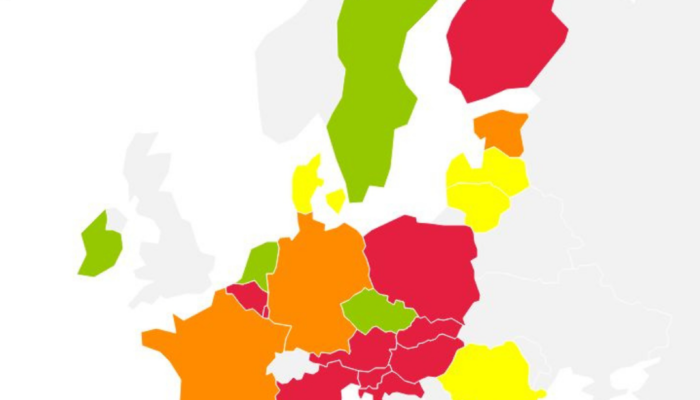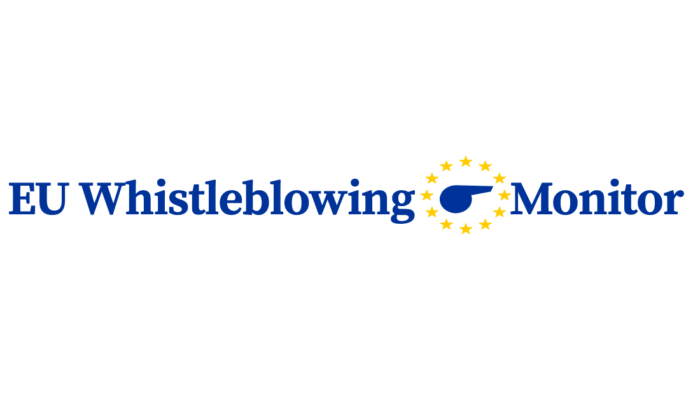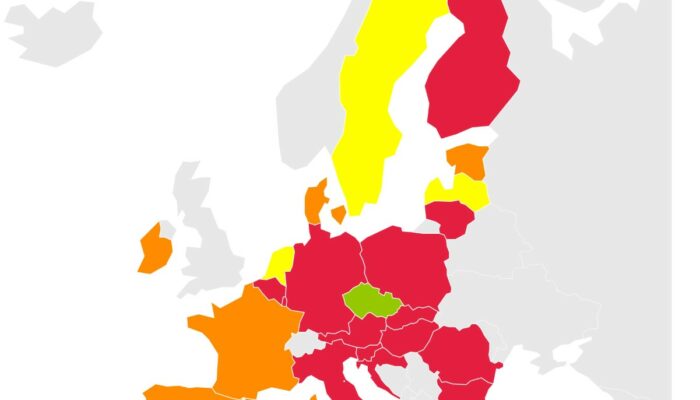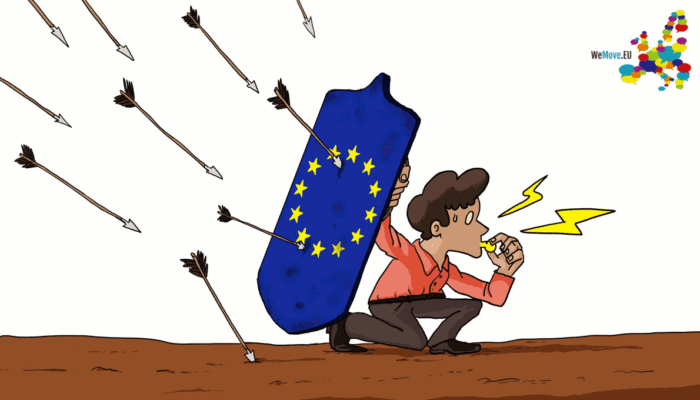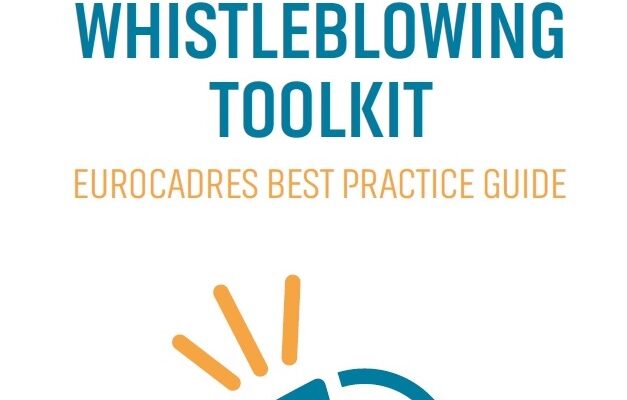EU whistleblower directive must give whistleblowers all reporting options
The European Union is expected to shortly adopt the EU’s flagship whistleblower protection directive. EPSU, believes it is essential that the final legislation fully protects whistleblowers and encourages whistleblowers to report wrongdoing, through which ever route they consider most appropriate, be that the media or relevant authorities.

We believe it is also important the whistleblowers have the support by being represented by trade unions throughout the reporting process.
Currently the French government, amongst others, is particularly adamant to force potential whistleblowers to report first internally before going to a public authority or to the media.
Right to choose
Two high profile cases relating to health show why whistleblowers must be free to choose reporting channels.
The French ‘Moussaron Affair’ was exposed by Céline Boussié, a medical-psychological assistant, reporting the long-standing abuse of disabled children at the Institute for Disabled Children (IMC), in Moussaron, where she worked between 2008 and 2013.
Two high profile cases relating to health show why whistleblowers must be free to choose reporting channels.
She initially reported internally, after which the institute attempted to intimidate her into silence. Her team faced repercussions, she became isolated within the organisation. Ms Boussié faced intimidation from her colleagues in a vicious social media campaign her house and garden were attacked, and she felt so frightened she moved her two children out of their family home. So internal reporting clearly only had negative effects for the whistleblower in this case.
Despite the internal pressure, Ms Boussié, then reported externally to the public Regional Health Authority, Government Ministers and to the President of the French Republic. She received no replies, and nothing was done.
Media attention
It was only after a TV documentary exposed the horrific abuse taking place at IMC, that the Minister for Health placed the institute under Provisional Administration, putting an end to the many years of abuse. However, Ms Boussié paid a very high price, for whistleblowing. She was forced out of the Institute and, on top of it, the IMC launched a legal libel case against her.
Throughout all of this, Ms Boussié received practical and legal support from the trade union, CGT-Santé et Action Sociale, who organised protests in support of her outside the court buildings and has been calling for institutional abuse to be recognised as a criminal offence. Eventually IMC’s lawsuit for libel was dismissed. The judgement confirmed the horrific veracity of what Ms Boussié had reported.
These cases highlight two essential points ... : [whistleblowers] must be allowed to report outside the workplace without having to go internally first and they must be supported and represented by trade unions.
Another legal case which Ms Boussié filed with the support of the union in 2013 is still ongoing in the labour court. She continues to receive legal, practical and moral support from the CGT. Ms Boussié is determined to clear her name, win the case for unfair dismissal, be reinstated and have her status as a valid whistleblower, fully recognised. The final stage of the labour case is to take place shortly.
Internal reporting without impact
The second example which challenges the insistence on mandatory internal reporting, concerns blood donor machines, produced by Haemonetics, a US company. In 2013, Mr Berthelot and Mr Urrecho, two employees of Haemonetics, reported internally to their then employer concerns about the company’s blood donor machines that ran high risks of carcinogenic contamination for donors. Their concerns were totally dismissed by the company. Once again internal reporting had no impact. The whistleblowers then went to the relevant public health authorities, who ruled the evidence against Haemonetics machines inconclusive.
In 2015 Mr Berthelot reached out to Guylain Cabantous, employee and trade union representative at the French Blood Agency (Etablissement Français du Sang, EFS), an important customer of Haemonetics. Mr Cabantous carried out his own investigation in light of the public agency’s quality control procedure and concluded that the machines were indeed faulty, filing written reports to his employer.
The lack of reaction from the public authorities eventually hit headlines. In May 2018, the two whistleblowers with the support of Mr Cabantous’ union filed a complaint to the Court against the health authorities and Haemonetics for endangering the life of others and failing to phase out an harmful product.
It is strongly believed that it is the combination of public disclosure and legal complaint which eventually led the French health authorities to suspend in September last the use of the Haemonetics blood donors machines until an in-depth investigation has been completed. The French union, CGT Santé welcomed the temporary decision.
Retribution fast and fierce
For the two Haemonetics employees, however, retribution was fast and fierce. Mr Urrecho was dismissed for medical unfitness, despite having worked for Haemonetics for thirty years and Mr Berthelot was sacked for ‘disloyal behaviour’ in 2015.
Trade unions can be an effective shield against whistleblowers’ isolation.
Both whistleblowers went on long-term sick leave before the termination of their contracts came into force. The trade union CGT-Santé et Action Sociale had been supporting both Berthelot and Urrecho, throughout this long process, giving them advice, support and representing them not the least to have their sickness absence recognised as occupational.
These cases highlight two essential points for the directive to protect effectively whistleblowers: they must be allowed to report outside the workplace without having to go internally first and they must be supported and represented by trade unions. Trade unions can be an effective shield against whistleblowers’ isolation.
MORE ARTICLES
Progress update: Are EU Governments taking whistleblowing protection seriously?
Today, on World Whistleblowing Day 2021 – less than 6 months before the deadline to transpose the Directive – we highlight key developments in EU countries since the publication of the report.
New civil society monitor on the EU Whistleblowing Directive
The partnership of Eurocadres, the Whistleblowing International Network (WIN) and Transparency International EU is delighted to announce the development and launch of EU Whistleblowing Monitor, a new online platform to monitor transposition and implementation of the EU Directive on Whistleblowing (2019/1937) across Europe.
EU whistleblowing provisions need adjustments in member states
Seven months remains for EU member states to transpose the whistleblower directive into national legislation.
Can transposing the Whistleblower Protection Directive be done on time? Maybe, but not at the cost of transparency and inclusiveness
EU governments were given two years to bring their national whistleblowing frameworks in line with the EU Directive on Whistleblower Protection.
Are EU Countries taking whistleblower protection seriously?
Transposition of the Whistleblower Protection Directive is a chance to ensure that people can expose abuses safely across the European Union – but EU nations might be letting the opportunity pass us all by.
EU Whistleblowing Meter monitors transposition process
The EU Whistleblowing Meter tracks the progress of transposition in each country.
Half a decade of whistleblower directive advocacy
Professor Wim Vandekerckhove from University of Greenwich has analysed the work of the platform in reaching a directive proposal on the protection of whistleblowers.
EVENT – Call to action: Whistleblower protection across the EU, 23 February
EVENT – 23 February, 14:00 – 15:30 (CET)
Best practice guide on whistleblowing for trade unions
What should be the role of trade unions in whistleblowing? Which internal arrangements, should be in place to establish a culture which promotes whistleblowing?
EU Whistleblowing Meter Launched to Monitor Transposition of EU Directive on Whistleblowing
On World Whistleblowing Day, 23 June, the Whistleblowing International Network along with its many partners and colleagues across Europe are launching the EU Whistleblowing Meter


